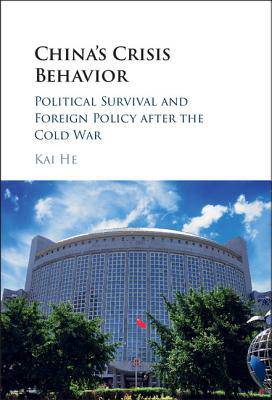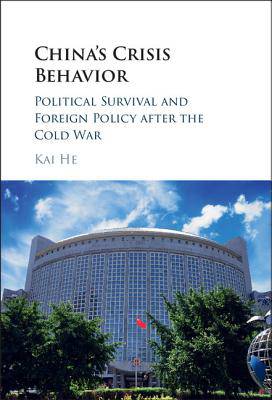
- Afhalen na 1 uur in een winkel met voorraad
- Gratis thuislevering in België vanaf € 30
- Ruim aanbod met 7 miljoen producten
- Afhalen na 1 uur in een winkel met voorraad
- Gratis thuislevering in België vanaf € 30
- Ruim aanbod met 7 miljoen producten
Zoeken
China's Crisis Behavior
Political Survival and Foreign Policy after the Cold War
Kai He
Hardcover | Engels
€ 180,45
+ 360 punten
Uitvoering
Omschrijving
Since the end of the Cold War, China has experienced several notable interstate crises: the 1999 'embassy bombing' incident, the 2001 EP-3 mid-air collision with a United States aircraft, and the Diaoyu/Senkaku dispute with Japan. China's response to each incident, however, has varied considerably. Drawing from a wealth of primary sources and interviews, this book offers a systematic analysis of China's crisis behavior in order to identify the factors which determine when Chinese leaders decide to escalate or scale down their response to crises. Inspired by prospect theory - a Nobel Prize-winning behavioral psychology theory - Kai He proposes a 'political survival prospect' model as a means to understand the disparities in China's behavior. He argues that China's response depends on a combination of three factors that shape leaders' views on the prospects for their 'political survival status', including the severity of the crisis, leaders' domestic authority, and international pressure.
Specificaties
Betrokkenen
- Auteur(s):
- Uitgeverij:
Inhoud
- Aantal bladzijden:
- 186
- Taal:
- Engels
Eigenschappen
- Productcode (EAN):
- 9781107141988
- Verschijningsdatum:
- 7/04/2016
- Uitvoering:
- Hardcover
- Formaat:
- Genaaid
- Afmetingen:
- 152 mm x 229 mm
- Gewicht:
- 417 g

Alleen bij Standaard Boekhandel
+ 360 punten op je klantenkaart van Standaard Boekhandel
Beoordelingen
We publiceren alleen reviews die voldoen aan de voorwaarden voor reviews. Bekijk onze voorwaarden voor reviews.











